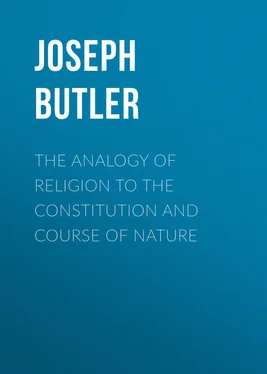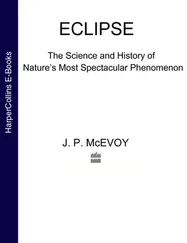Joseph Butler - The Analogy of Religion to the Constitution and Course of Nature
Здесь есть возможность читать онлайн «Joseph Butler - The Analogy of Religion to the Constitution and Course of Nature» — ознакомительный отрывок электронной книги совершенно бесплатно, а после прочтения отрывка купить полную версию. В некоторых случаях можно слушать аудио, скачать через торрент в формате fb2 и присутствует краткое содержание. Жанр: foreign_antique, foreign_prose, на английском языке. Описание произведения, (предисловие) а так же отзывы посетителей доступны на портале библиотеки ЛибКат.
- Название:The Analogy of Religion to the Constitution and Course of Nature
- Автор:
- Жанр:
- Год:неизвестен
- ISBN:нет данных
- Рейтинг книги:3 / 5. Голосов: 1
-
Избранное:Добавить в избранное
- Отзывы:
-
Ваша оценка:
- 60
- 1
- 2
- 3
- 4
- 5
The Analogy of Religion to the Constitution and Course of Nature: краткое содержание, описание и аннотация
Предлагаем к чтению аннотацию, описание, краткое содержание или предисловие (зависит от того, что написал сам автор книги «The Analogy of Religion to the Constitution and Course of Nature»). Если вы не нашли необходимую информацию о книге — напишите в комментариях, мы постараемся отыскать её.
The Analogy of Religion to the Constitution and Course of Nature — читать онлайн ознакомительный отрывок
Ниже представлен текст книги, разбитый по страницам. Система сохранения места последней прочитанной страницы, позволяет с удобством читать онлайн бесплатно книгу «The Analogy of Religion to the Constitution and Course of Nature», без необходимости каждый раз заново искать на чём Вы остановились. Поставьте закладку, и сможете в любой момент перейти на страницу, на которой закончили чтение.
Интервал:
Закладка:
Ans. 1. Natural religion is no less perverted, and has done less good.
2. The benefits of Christianity are not small.
3. The evils ascribed to it, are not its effects. Things are to be judged by their genuine tendencies.
4. The light of reason, no more than revelation forces acquiescence.
5.) With the additional advantage that every Christian, is bound to instruct and persuade others.
1.A mode of salvation for the ruined.
2.Duties unknown before.
3.Our relations to the Son and Holy Ghost.
1.) Hence the form of baptism.
2.) Pious regards to Christ, and the Holy Ghost, based on our relations to them.
4.The manner of external worship.
1.Those who think natural religion sufficient , must admit that Christianity is highly important .
2.Our relations to Christ being made known, our religious regard to him is an evident obligation.
3.These relations being real, there is no reason to think that our neglect of behaving suitably to them, will not be attended with the same kind of consequences as follow the neglect of duties made known by reason.
4.If we are corrupt and depraved, and so unfit for heaven, and if we need God’s Holy Spirit to renew our nature, how can it be a slight thing whether we make use of the means for obtaining such assistance?
5.Thus, if Christianity be either true, or merely credible, it is most rash and presumptuous to treat it lightly.
1.The distinction between positive and moral obligations.
1.) For moral precepts we can see the reason : for positive we cannot.
2.) Moral duties are such prior to command; positive duties are such because commanded.
3.) The manner in which a duty is made known, does not make it moral or positive.
2.The ground of regarding moral duties as superior to positive.
1.) Both have the nature of moral commands.
2.) If the two conflict, we must obey the moral.
– Positive institutions are means to moral ends.
– Ends are more excellent than means.
– Obedience to positive institutions, has no value but as proceeding from moral principle.
3.) Both moral and positive duties are revealed , and so are on a level; but the moral law is also interwoven with our very nature, and so its precepts must prevail when the two interfere.
3.There is less necessity for determining their relative authority, than some suppose.
1.) Though man is disposed to outward and ritual religion, nothing can give us acceptance with God, without moral virtue.
2.) Scripture always lays stress on moral duties.
3.) It is a great weakness, though very common, to make light of positive institutions, because less important than moral.
– We are bound to obey all God’s commands.
– A precept, merely positive, admitted to be from God, creates moral obligation, in the strictest sense.
This account of Christianity shows our great obligation to study the Scriptures.
Having shown the need of revelation, we now examine the presumptions against it.
The analogy of nature is generally supposed to afford presumptions against miracles.
They are deemed to require stronger evidence than other events.
1.It is no presumption against Christianity, that it is not the discovery of reason, or of experience.
2.Nor is it a presumption against Christianity, that it contains things unlike the apparent course of nature.
1.) We cannot suppose every thing, in the vast universe, to be just like what is the course of nature in this little world.
2.) Even within the present compass of our knowledge, we see many things greatly unlike.
3.If we choose to call what is unlike our known course of things, miraculous , still that does not make it improbable .
1.There was then no course of nature, as to this world.
2.Whether man then received a revelation involves a question not of miracles, but of fact .
3.Creation was a very different exertion of power from that which rules the world, now it is made.
4.Whether the power of forming stopped when man was made; or went on, and formed a religion for him, is merely a question as to the degree or extent , to which a power was exerted.
5.There is then no presumption from analogy against supposing man had a revelation when created.
6.All tradition and history teaches that he had, which amounts to a real and material proof.
1.Such a presumption, requires the adduction of some parallel case.
2.This would require us to know the history of some other world.
3.Even then, if drawn from only one other world, the presumption would be very precarious.
To be more particular ,
1.There is a strong presumption against any truth till it is proved – which yet is overcome by almost any proof.
– Hence the question of a presumption against miracles, involves only the degree of presumption, (not whether the presumption is peculiar to miracles,) and whether that degree is such as to render them incredible.
2.If we leave out religion , we are in total darkness as to the cause or circumstances on which the course of nature depends.
– Five or six thousand years may have given occasion and reasons for miraculous interpositions of Providence.
3. Taking in religion , there are distinct reasons for miracles; to afford additional instruction; to attest the truth of instruction.
4.Miracles must not be compared with common events, but with uncommon; earthquakes, pestilence, &c.
1. There are no analogies to render miracles incredible.
2. On the contrary, we see good reasons for them.
3. There are no presumptions against them, peculiar to them, as distinguished from other unusual phenomena.
Beside the objectors to the evidences of Christianity, there are many who object to its nature . They say it is not full enough: has in it foolish things: gives rise to superstition: subserves tyranny: is not universally known: not well arranged: figurative language, &c.
It is granted that if it contained immoralities or contradictions they would show it to be false. But other objections against religion, aside from objections against its evidences, are frivolous: as will now be shown.
Читать дальшеИнтервал:
Закладка:
Похожие книги на «The Analogy of Religion to the Constitution and Course of Nature»
Представляем Вашему вниманию похожие книги на «The Analogy of Religion to the Constitution and Course of Nature» списком для выбора. Мы отобрали схожую по названию и смыслу литературу в надежде предоставить читателям больше вариантов отыскать новые, интересные, ещё непрочитанные произведения.
Обсуждение, отзывы о книге «The Analogy of Religion to the Constitution and Course of Nature» и просто собственные мнения читателей. Оставьте ваши комментарии, напишите, что Вы думаете о произведении, его смысле или главных героях. Укажите что конкретно понравилось, а что нет, и почему Вы так считаете.












